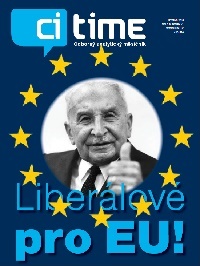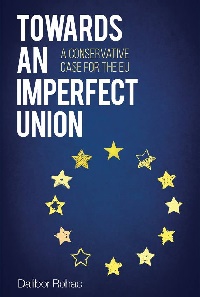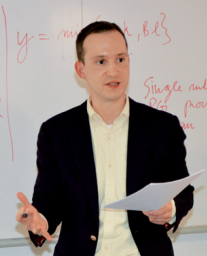EU as a Hayekian federation
About conservative case for EU, much needed reforms to cope with nationalism and pragmatic conservation of monetary union as well as about meaning of bitcoin with Dr. Dalibor Roháč, research fellow at American Enterprise Institute.
 Dr. Roháč, in your book Towards an Imperfect Union: A Conservative Case for the EU you call to conservatives, classical liberals, and free marketeers who more and more often criticize the EU as a dangerous attempt at central planning – a bureaucratic “road to serfdom” – to potentially reconsider. Despite once having been a vocal Eurosceptic yourself, you now make a Hayekian argument for the EU, even drawing on Friedrich A. Hayek’s writings on federalism to make your case. What made you change your mind? What are the benefits of an interstate federation for a free society?
Dr. Roháč, in your book Towards an Imperfect Union: A Conservative Case for the EU you call to conservatives, classical liberals, and free marketeers who more and more often criticize the EU as a dangerous attempt at central planning – a bureaucratic “road to serfdom” – to potentially reconsider. Despite once having been a vocal Eurosceptic yourself, you now make a Hayekian argument for the EU, even drawing on Friedrich A. Hayek’s writings on federalism to make your case. What made you change your mind? What are the benefits of an interstate federation for a free society?
I still think that there is a lot that classical liberals and conservatives can and should critize about the European project! Indeed my course at CEVRO is an overview of some of the biggest problems plaguing the EU – the Euro, migration, overregulation, and others. I suppose what made me change not so much my view as the emphasis I place on different issues, is the realization that for all the problems that Europe has, the continent has never seen a period friendlier to free enterprise, limited government, which was more economically open or peaceful than the time we’re living in. And that is not an accident. Writing in the 1930s and the 1940s, thinkers such as Hayek, R?pke or Mises understood that unless Europeans create a platform for international governance, they were doomed to repeat the horrific experience of the first half of the 20th century. After the war, Europeans indeed created such a platform for international governance. It is not perfect, of course. But right now, it comes under unprecedented pressure. There is a real danger that it unravels, returning us precisely to a situation that Hayek et al. urged us to avoid.
You emphasize the importance of taking into account the “relevant counterfactual” in our discussions of EU integration – could you elaborate, what do you mean?
The University of Chicago economist Harold Demsetz coined the concept of the ‘Nirvana fallacy’, the comparison of the existing, necessarily imperfect institutions and arrangements with some impossible ideal. Of course, we should be comparing what is with available alternatives, not some impossible standards. A libertarian utopia is not on the menu in Europe, nor is a single market based on simple, unconditional mutual recognition of standards. When we criticize (for good reasons!) the excesses of European regulation, we need to be mindful that oftentimes the relevant alternative to an EU directive we don’t particularly like are 28 mutually incompatible pieces of national legislation – something that would make doing business on the continent far more difficult. More generally, we need to be aware of a Europe of nation states, unconstrained by organizations such as the EU, would likely look like. Again, it wouldn’t be a continent particularly friendly to free trade, economic openness, or limited government. It might not even be peaceful. How do I know? Well, we’ve done a Europe of nation states in the past, and it didn’t work very well.
The EU, as it currently exists, is not a proper federation either, correct? So you are not really making a case for the EU as we know it, but for a new and reformed EU? Reformed in what sense? What kind of change are you arguing for?
The key problem with the EU is that it falls short of the classical liberal vision of an international federation. It overstretches itself into areas where there is no reason to have single European policies (think about agriculture, for example) and at the same time it is ill-equipped to provide some of the most basic Europe-wide public goods. What follows are these instances of overreach and inability to deliver, which gradually erode trust that voters have in the entire thing. What we need is an EU that has the ability to do a small number of important things within an understandable system of constitutional rules, and leaves everything else to states and local governments – as proper federations do.
It seems many of the problems and tensions in the European Union are caused by the euro – do you believe a single currency is a necessary or desirable feature of a federation? Will the euro survive in its current form, and more importantly: should it?
Hayek took it for granted that his ideal of international federation would also feature a single currency. However, the introduction of the Euro was a clear example of overreach, since the preconditions for a successful monetary union were not in place. There was a blind faith that those would emerge afterwards, but so far they mostly haven’t. If we could go back in time and get rid of the Euro, I’d say do it. Unfortunately in the real world, dismantling existing currency unions can be tricky. The problem is not so much the competitive devaluations, which in the 1930s arguably helped in the recovery from the Great Depression, but rather in the possible effects on the financial industry. We are simply very bad at dismantling large insolvent financial institutions without creating lots of collateral damage in the real economy. For that reason alone, I don’t wish for the Eurozone to unravel. Whether it will or not is another matter.
What is your opinion of alternative currencies such as bitcoin, or even free-banking, as potential improvements of the established monetary systems?
I think bitcoin is an interesting platform for financial innovation as it allows the creation of various self-enforcing contracts that would not be possible without blockchain. However, because of its deflationary nature, I don’t think it can function as an effective unit of account. There is, of course, a large literature on free banking and on how it compares to the existing system of central banking. I’m not an expert in the area but I’m generally inclined to favor competition. The real question is one of the transition -- can politicians commit to remove monetary policy from the public realm, how do new currencies get around the problem of network externalities, etc.?
Economists generally agree that the liberalization of international trade has been one of the major contributing factors to modern economic growth and the associated rise in living standards across the globe. Yet, in the political arena it seems we are seeing a backlash in recent times. Populist, anti-globalist, protectionist movements are gaining in strength in many EU countries, we have witnessed the Brexit referendum, the election of Donald Trump... What do you think are the reasons behind this?
There are many political scientists who are trying to explain the rise of populism by economic, cultural, sociological factors. With my co-authors, Andreas Johansson Heinö and Sahana Kumar, we have a paper that looks at support for Europe’s populists on the political left and right, between 1980 and 2016. We find that corruption has a strong effect on support for such parties, particularly on the right. But more broadly, I think it is a question of ideas. Sometimes, the climate of ideas shifts towards protectionism, fear of the unknown, and distrust of impersonal market forces. I think we’re living through one of those moments right now.
 Apart from the analysis of European integration, what else do your research interests focus on? Any future big research projects in the works, another book perhaps?
Apart from the analysis of European integration, what else do your research interests focus on? Any future big research projects in the works, another book perhaps?
I am interested, as I said, in populism, especially of the authoritarian variety. There is something emotional about the narratives offered by the likes of Trump or Le Pen that just resonates with voters. I think classical liberals need to get to the bottom of it and be able to offer their own narratives, celebrating freedom, democratic capitalism, and openness in a way that will resonate with voters at a gut level. That, I think, is the biggest challenge our movement faces right now.
Is there any advice you would offer to students who might be interested in pursuing a career in the think-tank and policy advocacy arena as you have?
Find something you’re passionate about, try to develop as thorough an understanding of it as possible. Write a lot and early in the thinking process. Thinking without writing is daydreaming, the Nobel Prize-winning economist James Buchanan used to say. Read outside of your comfort zone. At all times, be a good colleague and a nice person.
Dalibor Roháč
-
 Research fellow at the American Enterprise Institute (AEI), where he studies European political and economic trends.
Research fellow at the American Enterprise Institute (AEI), where he studies European political and economic trends.
-
Visiting fellow at the Max Beloff Centre for the Study of Liberty at the University of Buckingham in the UK
-
Fellow at the Institute of Economic Affairs in London
-
Roháč’s analyses and commentary, focused predominantly on the political economy of Europe, have been published widely in the media, including in the New York Times, Financial Times, Foreign Policy and Wall Street Journal.
-
His scholarly articles have appeared in proffesional journals like Constitutional Political Economy, Economic affairs and European Journal for the History of Economic Thought
-
He studied at George Mason University and at University of Oxford, he obtained his Ph.D. in political economy at King’s College London
-
He is also part of faculty at CEVRO Institute where he lectures within the Philosophy, Politics and Economics (PPE) programme